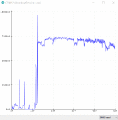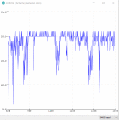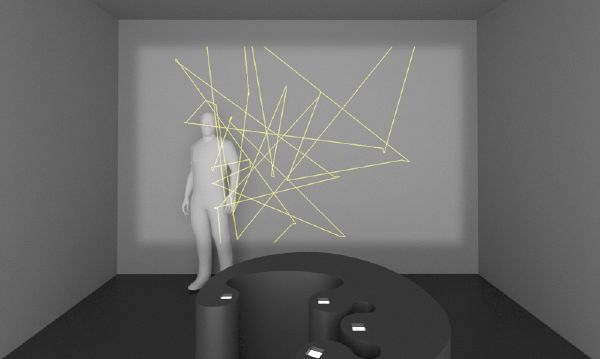| (40 intermediate revisions by 2 users not shown) | |||
| Line 1: | Line 1: | ||
Organic Pulse Imagery is a project | ==Project== | ||
'''Organic Pulse Imagery''' is an art installation that unites the audience with parts of different organisms, an installation art for humans to experience different space, time and place. In this project, I will capture the electrical conductivity of the organisms in order to convey the message that there are various microorganisms everywhere around us. Then, I will send that input to Max/msp and generate a 3D/2D graphic of their electrical conductivity and project that graphic onto the wall, therefore the audiences can participate in the immersive space created. | |||
This idea is more likely to be an exhibition approach, which people can choose the organisms by themselves and interact with it. | |||
[[File:1550091367913.jpg|700px]] | |||
The installation includes a counter which has a projector built-in, on top of the counter is a petri dishes slots that allow the participants to choose the organisms that they're interested to interact with and place it in the isolated slot which is connected to the Arduino, moreover the slots are used as an incubator for the organisms to keep them living with the suitable temperature. | |||
This project is related to my Max/msp project. It can be found here: | |||
[https://www.uni-weimar.de/kunst-und-gestaltung/wiki/GMU:Connecting_Max_to_the_World/Sirin_Unmanee Link to my Max/msp Project] | |||
==Capturing the electric potentials and generating the visual== | |||
To capture the electric potentials from the organism, I have to create a split petri dish with a small bridge between each slot to allow the electricity form the organism to flow, moreover, in this approach, I will be able to capture small differences in electric signals only from the organism, not the medium. | |||
<gallery> | |||
File:1550089570918.jpg | |||
File:S__2883601.jpg | |||
</gallery> | |||
The | The selected organism is Physarum Polycephalum. It was cultivated on the aforementioned split petri dish. After many attempts, I found out that the most important factor is the timing, in that the slime mold needs around two days to cross the bridge. Longer than that then it will remain on its side. In contrast, earlier than that then it will not cross the bridge. | ||
<gallery> | |||
File:S__2916455.jpg | |||
File:S__3022883.jpg | |||
File:S__3022878.jpg | |||
</gallery> | |||
For capturing the electricity, I use the capacitive sensor method. | |||
<gallery> | |||
File:1548854244532.jpg | Arduino sketch : [[:File:sensor_reading.ino]] | |||
File:S__3022893.jpg | Setting | |||
File:1550086962883.gif | At the beginning, I captured the electricity from my hands in order to observe the numbers to differentiate between the electric potentials of human beings and microorganisms. | |||
File:1550087861699.gif | Then, I connected the wires to the organism. | |||
</gallery> | |||
The captured number from my hands is around 6000 - 7500, while the number of Physarum Polycephalum is around 10 - 21 and more stable. | |||
The | |||
Because of the significant contrast between each organism, it can be discriminated to generate the different visuals. In this case, I experimented with two organisms; human and Physarum. | |||
*[[/Growing | <gallery> | ||
File:max part1.jpg | Max/msp patch : [[:File:diybioproject sirin 2019012901.maxpat]] | |||
File:1550093874605.gif | The generated visual from Physarum's electric potential. | |||
File:1550093939598.gif | The generated visual from Human's electric potential. | |||
</gallery> | |||
As seen in the images above, the shapes' density depends on the serial read number and the styles are characterized separately. | |||
Further possibilities are to prepare more organisms and program the specific visuals for each of them, since I've worked with many organisms for this project and I noticed that they actually have slightly diverse electric potentials. Below here is the experiments that I did for this project. | |||
*[[/Growing organisms for my project]] | |||
*[[/Electric Potentials]] | *[[/Electric Potentials]] | ||
==The Setting== | |||
The ideal setting is not only to build the installation space, but also to produce a suitable place and environment for the organisms. The main element of the installation is the counter that has all the crucial components built-in. | |||
<gallery> | |||
File:sketch 2018121704.jpg | |||
File:sketchcounteriso.JPG | |||
File:sketchcountertopview.JPG | |||
</gallery> | |||
The electrical conductivity data from the chosen organisms is going to be generated with Max/msp into a visual, then that visual will be projected onto the wall, as well as on their body. | |||
[[File:sketchtive.jpg|600px]] | |||
==Further research== | ==Further research== | ||
*[[/23.10.2018 : Growing Physarum polycephalum (1st attempt) ]] | *[[/23.10.2018 : Growing Physarum polycephalum (1st attempt) ]] | ||
*[[/30.10.2018 : Isolating Bacteria from Kombucha, Growing Physarum polycephalum (2nd attempt) and others]] | *[[/30.10.2018 : Isolating Bacteria from Kombucha, Growing Physarum polycephalum (2nd attempt) and others]] | ||
*[[/06.11.2018 : Growing Mycelium and Experimenting with organic matter's electricity]] | *[[/06.11.2018 : Growing Mycelium and Experimenting with organic matter's electricity]] | ||
*[[/13.11.2018 : Initial Idea]] | *[[/13.11.2018 : Initial Idea]] | ||
==References== | ==References== | ||
Latest revision as of 13:08, 31 March 2019
Project
Organic Pulse Imagery is an art installation that unites the audience with parts of different organisms, an installation art for humans to experience different space, time and place. In this project, I will capture the electrical conductivity of the organisms in order to convey the message that there are various microorganisms everywhere around us. Then, I will send that input to Max/msp and generate a 3D/2D graphic of their electrical conductivity and project that graphic onto the wall, therefore the audiences can participate in the immersive space created.
This idea is more likely to be an exhibition approach, which people can choose the organisms by themselves and interact with it.
The installation includes a counter which has a projector built-in, on top of the counter is a petri dishes slots that allow the participants to choose the organisms that they're interested to interact with and place it in the isolated slot which is connected to the Arduino, moreover the slots are used as an incubator for the organisms to keep them living with the suitable temperature.
This project is related to my Max/msp project. It can be found here: Link to my Max/msp Project
Capturing the electric potentials and generating the visual
To capture the electric potentials from the organism, I have to create a split petri dish with a small bridge between each slot to allow the electricity form the organism to flow, moreover, in this approach, I will be able to capture small differences in electric signals only from the organism, not the medium.
The selected organism is Physarum Polycephalum. It was cultivated on the aforementioned split petri dish. After many attempts, I found out that the most important factor is the timing, in that the slime mold needs around two days to cross the bridge. Longer than that then it will remain on its side. In contrast, earlier than that then it will not cross the bridge.
For capturing the electricity, I use the capacitive sensor method.
Arduino sketch : File:sensor_reading.ino
The captured number from my hands is around 6000 - 7500, while the number of Physarum Polycephalum is around 10 - 21 and more stable.
Because of the significant contrast between each organism, it can be discriminated to generate the different visuals. In this case, I experimented with two organisms; human and Physarum.
Max/msp patch : File:diybioproject sirin 2019012901.maxpat
As seen in the images above, the shapes' density depends on the serial read number and the styles are characterized separately.
Further possibilities are to prepare more organisms and program the specific visuals for each of them, since I've worked with many organisms for this project and I noticed that they actually have slightly diverse electric potentials. Below here is the experiments that I did for this project.
The Setting
The ideal setting is not only to build the installation space, but also to produce a suitable place and environment for the organisms. The main element of the installation is the counter that has all the crucial components built-in.
The electrical conductivity data from the chosen organisms is going to be generated with Max/msp into a visual, then that visual will be projected onto the wall, as well as on their body.
Further research
References
- Martin Howse, Radio Mycelium https://www.uni-weimar.de/kunst-und-gestaltung/wiki/images/Martin-howse.pdf
- Four Conditions for Bacterial Growth https://www.livestrong.com/article/126073-four-conditions-bacterial-growth
- How Can Bacteria Help Us? https://learning-center.homesciencetools.com/article/bacteria-experiment-guide
















